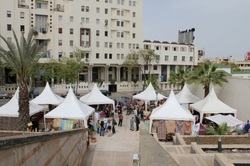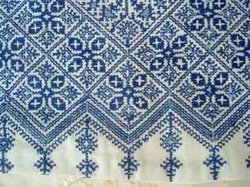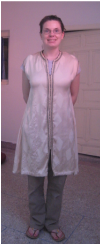Recently I met an American teacher here in Morocco who works for a school in Fes called Amicita. The school is an “international tri-lingual school located in the breathtaking city of Fez, Morocco. [They] offer an American-style education in an international environment, serving students from all over the world while honoring the beauty of the preserved ancient culture of Fez still present in the city today.” (http://www.americanschoolfes.com/). She invited me to come to Fes and speak with her Senior class about Peace Corps as well as the college experience. This was by far one of the most interesting conversations I’ve had with Moroccans since I’ve been in country and it was amazing to see the disparity between the “uneducated” young women I work with and the upper class students at this school.
The first difference was how they were dressed. None of the girls wore hijabs and (as it was a hot day) most were wearing short sleeve shirts with no jacket. The girls in my coop never leave the house with their arms exposed and 3/4ths of them wear hijabs. The next difference was the level of ambition the students had. Out of a class of about 11 students (one boy and ten girls) most of them were planning on going to college abroad immediately after graduation. Many wanted to be business majors, one wanted to be an engineer, and one wanted some sort of career in media. I could tell immediately that the school had done an amazing job of showing these girls what it was they were capable of.
We hit a lot of topics in the short time I was there – what college was like, how hard classes are, the experience of foreign students, how to set yourself apart from your classmates, extra-curricular activities, and balancing a job with school work. Additionally, we spoke about feminism, having a boyfriend, balancing a love life with friends and schoolwork, and drinking. I was surprised at where our discussion led as it is “shuma” (shameful) to talk about this kind of stuff and certainly to partake in it. It was interesting to see their candid views on boyfriends/love/feminism (the idea of putting yourself before a relationship always makes a splash – one girl even told me it was outright “wrong”, although some seemed to agree or at least understand it was an option).
I was so grateful to have had this experience. I felt like I was really able to introduce new ideas to the Seniors or reinforce things their teachers have been telling them. I felt like I made a difference in a way I am unable to with the women in my cooperative because of the importance of assimilating into the culture and not rocking the boat I live in everyday.
The first difference was how they were dressed. None of the girls wore hijabs and (as it was a hot day) most were wearing short sleeve shirts with no jacket. The girls in my coop never leave the house with their arms exposed and 3/4ths of them wear hijabs. The next difference was the level of ambition the students had. Out of a class of about 11 students (one boy and ten girls) most of them were planning on going to college abroad immediately after graduation. Many wanted to be business majors, one wanted to be an engineer, and one wanted some sort of career in media. I could tell immediately that the school had done an amazing job of showing these girls what it was they were capable of.
We hit a lot of topics in the short time I was there – what college was like, how hard classes are, the experience of foreign students, how to set yourself apart from your classmates, extra-curricular activities, and balancing a job with school work. Additionally, we spoke about feminism, having a boyfriend, balancing a love life with friends and schoolwork, and drinking. I was surprised at where our discussion led as it is “shuma” (shameful) to talk about this kind of stuff and certainly to partake in it. It was interesting to see their candid views on boyfriends/love/feminism (the idea of putting yourself before a relationship always makes a splash – one girl even told me it was outright “wrong”, although some seemed to agree or at least understand it was an option).
I was so grateful to have had this experience. I felt like I was really able to introduce new ideas to the Seniors or reinforce things their teachers have been telling them. I felt like I made a difference in a way I am unable to with the women in my cooperative because of the importance of assimilating into the culture and not rocking the boat I live in everyday.



